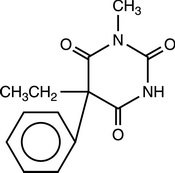Mebaral
Generic name: mephobarbital
Dosage form: tablet
Drug classes:Barbiturate anticonvulsants, Barbiturates
Medically reviewed by Drugs.com. Last updated on Apr 21, 2022.
Disclaimer: This drug has not been found by FDA to be safe and effective, and this labeling has not been approved by FDA. For further information about unapproved drugs, click here.
On This Page
DESCRIPTION
Mephobarbital, 5-Ethyl-1-methyl-5-phenylbarbituric acid, is a barbiturate with sedative, hypnotic, and anticonvulsant properties. It occurs as a white, nearly odorless, tasteless powder and is slightly soluble in water and in alcohol.
Mebaral is available as tablets for oral administration. The structural formula is:

Inactive Ingredients: Lactose, Starch, Stearic Acid, Talc.
CLINICAL PHARMACOLOGY
Barbiturates are capable of producing all levels of CNS mood alteration from excitation to mild sedation, to hypnosis, and deep coma. Overdosage can produce death. In high enough therapeutic doses, barbiturates induce anesthesia.
Barbiturates depress the sensory cortex, decrease motor activity, alter cerebellar function, and produce drowsiness, sedation, and hypnosis.
Barbiturates are respiratory depressants. The degree of respiratory depression is dependent upon dose. With hypnotic doses, respiratory depression produced by barbiturates is similar to that which occurs during physiologic sleep with slight decrease in blood pressure and heart rate.
Studies in laboratory animals have shown that barbiturates cause reduction in the tone and contractility of the uterus, ureters, and urinary bladder. However, concentrations of the drugs required to produce this effect in humans are not reached with sedative-hypnotic doses.
Barbiturates do not impair normal hepatic function, but have been shown to induce liver microsomal enzymes, thus increasing and/or altering the metabolism of barbiturates and other drugs. (See



